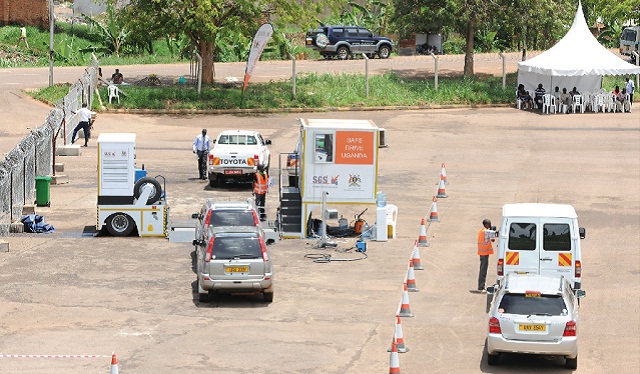
The government is yet to decide on whether or not to terminate the motor vehicle inspection deal
Kampala, Uganda | JULIUS BUSINGE | The Uganda government is in a fix. Suspend and cancel the contract awarded to the Switzerland based firm, SGS, to carry out a motor vehicle inspection and possibly pay the price for violating the agreement or stay the contract amidst any illegality, if at all it exists, and avoid the compensation.
This appears to have been the circumstance that played out during the parliamentary session on Feb 15.
The Speaker of Parliament, Rebecca Kadaga tasked the Attorney General, William Byaruhanga, to come up with a communication showing the risks or gains that would emerge in case the inspection exercise is suspended or contract cancelled.
This followed two recently released reports– the Majority and the Minority Reports that were compiled by legislators on the Physical Infrastructure Committee – in Parliament recommending suspension and cancellation of the contract respectively. The fate of the exercise is expected to be known this month.
The legislators say the events and procedure that led to the signing and awarding of the contract to SGS on March 17, 2015 were improper.
But there is a heavy cost for taxpayers to meet in case government buys the recommendations of the committee especially one in the minority report – that recommends cancellation of the contract.
According to the report, this particular contract termination or cancellation for any cause, except as provided in the contract, the government would pay SGS 75% of the value of total investments made or 100% of the expected income of the company. So far, SGS is said to have invested Shs51.2bn, according to the reports, though the committee claims that it doubts the figure.
This implies that the government could pay up to Shs38bn in case the contract is terminated or higher in case it has to pay all the expected income by SGS for the five-year contract.
“The committee notes with concern that while it may be considered prudent business to insulate private owners of capital from possible loss in doing business with government, using such contractual clauses, there has emerged an unscrupulous habit among public officials of saddling the country with the risk of exorbitant costs even when some of the clauses of such contracts are potentially bogus,” the report reads in part.
Key issues in the reports
Among the key issues in the contract was that SGS was to have seven sites. However, the reports indicate that only three sites are operational and that SGS would still not be ready for the commencement of inspection two years after signing the contract. This, MPs said, points to significant capacity gaps on the part of SGS.
The other issue is the possible connivance between the ministry of works officials and SGS staff for material gain. To make the situation even worse, the Solicitor General was not involved in drawing the contract which is unlawful.
 The Independent Uganda: You get the Truth we Pay the Price
The Independent Uganda: You get the Truth we Pay the Price



